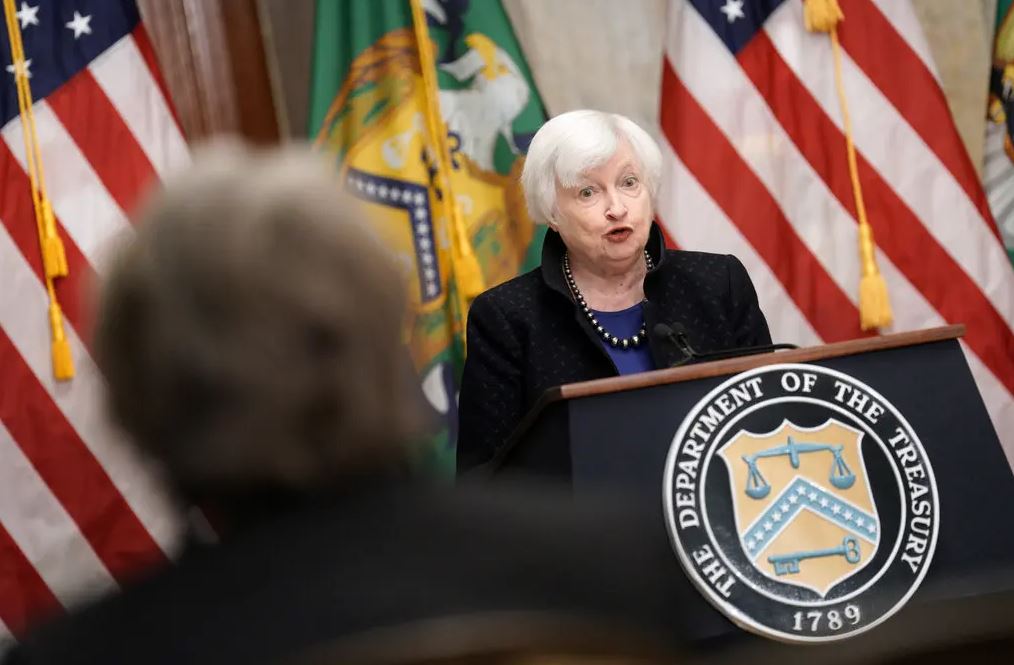The United States might run out of money to pay its debts by June 1 if Congress does not increase or extend the debt ceiling, Treasury Secretary Janet L. Yellen said on Monday, increasing pressure on President Biden and legislators to negotiate a speedy compromise to avoid defaulting on the nation’s debt.
With a clearer picture of when the United States would reach the so-called X-date, the estimated time for Congress to negotiate a compromise before the government runs out of money to pay all of its payments on time has shrunk significantly.
This is a high-stakes confrontation between the president and the House Republicans who have refused to extend the cap without severe expenditure cuts attached, and the new schedule might speed up discussions between the House, the Senate, and Mr Biden over federal spending.
Mr. Biden, in light of Ms. Yellen’s revised timeframe, contacted the four most powerful congressional leaders on Monday to propose a meeting on May 9 to address budgetary matters. The president called out to House Minority Leader Hakeem Jeffries of New York, Senate Majority Leader Chuck Schumer of New York, and Senate Minority Leader Mitch McConnell of Kentucky.
Financial experts have warned that a worldwide economic disaster might ensue if the United States is unable to borrow more money by increasing its debt ceiling.
The United States borrows enormous amounts of money to cover its enormous annual budget deficit, which occurs when spending exceeds revenue. The United States is not only responsible for paying its Social Security benefits and wages to its military and government employees, but also for making interest and other payments to the bondholders who own its debt.
The latest projection raises the worrisome possibility that the United States will be unable to make certain payments, including to bondholders, in a matter of weeks. The Treasury Department had previously forecast that it could run out of cash sometime in early June.
On Monday, the Congressional Budget Office issued a similar warning, emphasising the urgency of the situation. The independent budget agency reported lower-than-expected tax collections from April’s income payments and predicted similar results from subsequent instalments.
The White House is caught off guard by the impending default deadline, and the president’s response to the looming crisis may be thrown off by the compressed timeline.
Schumer and Jeffries have called on Republicans to raise the cap immediately and without conditions. The legislators wrote in a joint statement on Monday that they do not have time to wait until June 1 to come together and approve a clean bill to avoid a default and avert catastrophic effects for the economy and millions of American households.
To buy additional time for discussions, legislators may temporarily raise or suspend the debt ceiling if they fear a default on June 1. However, the Republican Party is fractured, so even that short-term solution isn’t guaranteed.
According to a Treasury Department official, the federal government had around $300 billion in cash on hand as of April 30. The amount of tax income the federal government receives this spring will be a key factor in determining how long Ms. Yellen will be able to avoid a default.
The tax refunds for the year 2022 are still trickling in. Experts at Goldman Sachs predicted last week that the Treasury Department would have around $60 billion in cash left by the second week of June, enough to keep the government paying its bills until late July.
Some fiscal experts have raised concerns that severe weather this winter could make it difficult for the Treasury Department to postpone a default. The April 18 filing deadline has been extended until October in hundreds of counties after severe storms, floods, and mudslides in California, Alabama, and Georgia this year.
Policymakers have warned that the United States may run dry of cash in three months, thus the government has sold bonds with maturities in that time frame and bought bonds with maturities of one month or less.
The price of protecting bond portfolios against the risk of a U.S. default has also increased significantly. However, there are analysts who argue that the market reaction needs to be much stronger in order to prompt a quick deal.
The catastrophic ramifications of failing to extend the debt ceiling were detailed in a separate study published by the Treasury Department on Monday about the risks confronting the economy and written by Eric Van Nostrand, the acting assistant secretary for economic policy.

